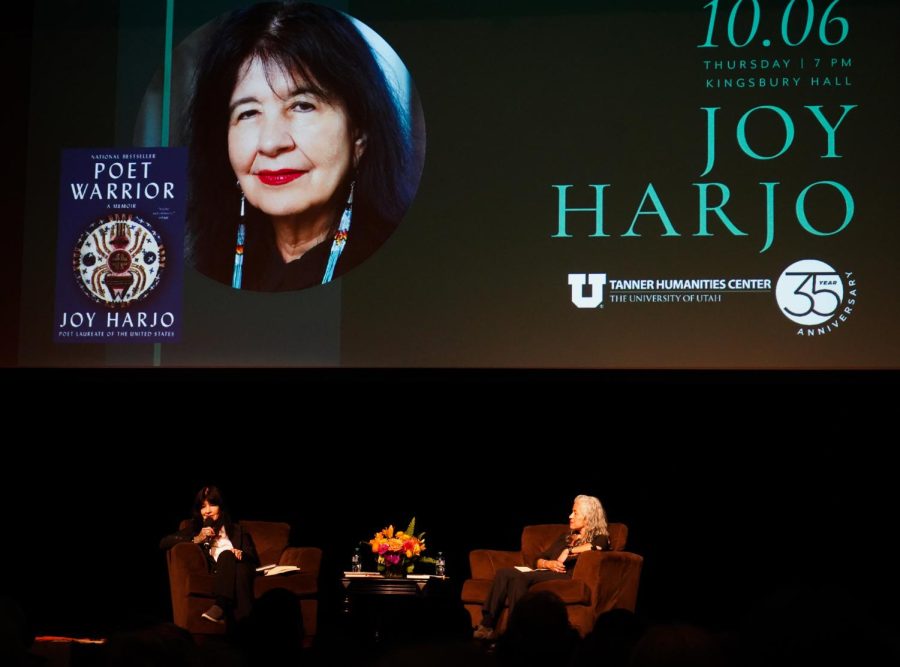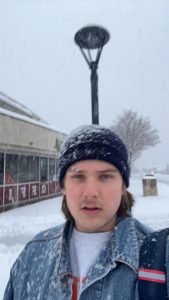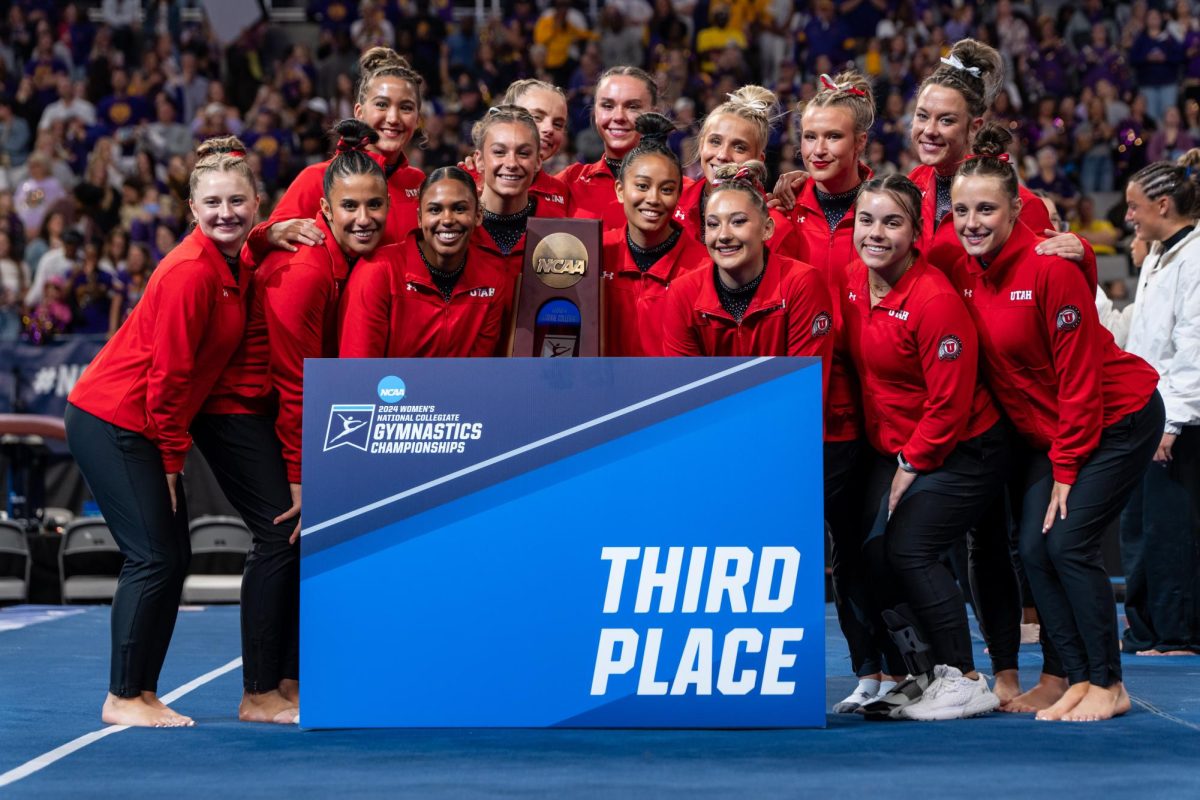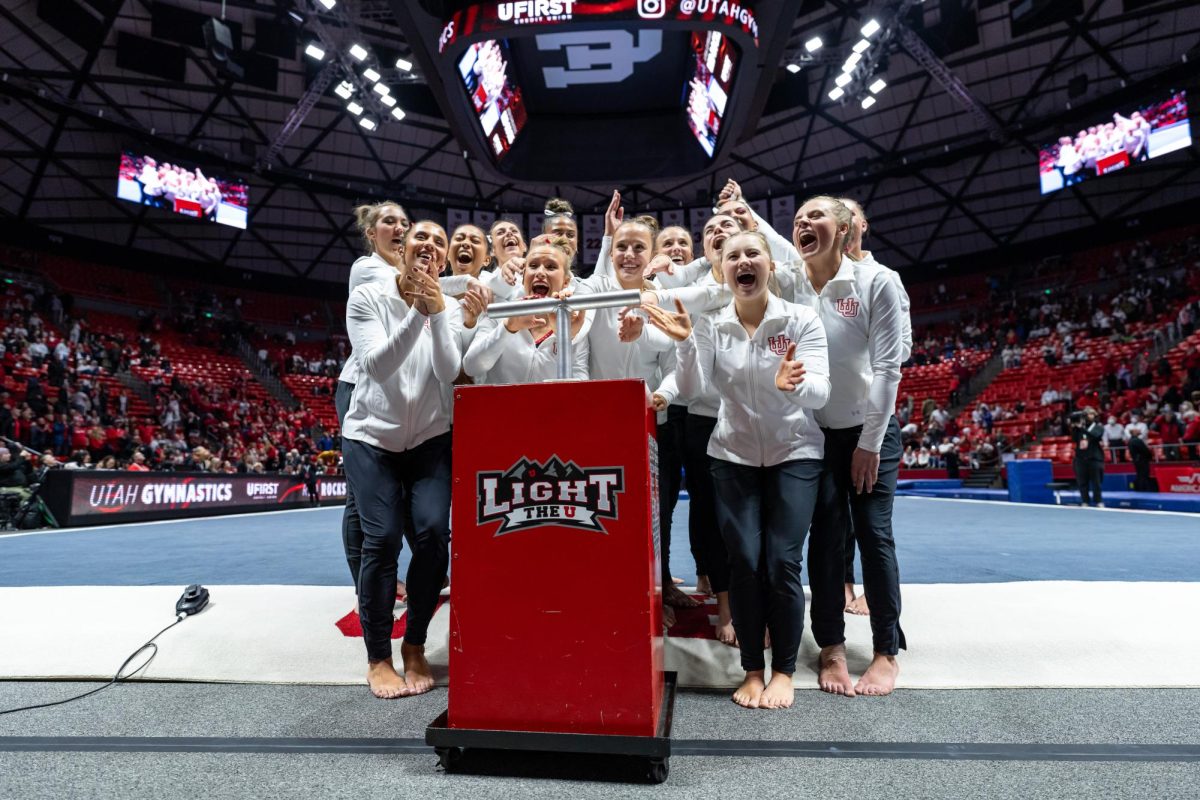U Welcomes Former U.S. Poet Laureate Joy Harjo for Author Meets Readers Series
Famous Native American poet and author, Joy Harjo, reads excerpts of her poetry for the audience in Kingsbury Hall on the University of Utah campus, in Salt lake City, Utah, on Oct. 6, 2022. (Photo by Deylan Gudiel | The Daily Utah Chronicle)
October 7, 2022
The University of Utah welcomed former U.S. Poet Laureate Joy Harjo for the Author Meets Readers series in Kingsbury Hall on Oct. 6. Harjo discussed her writing and life experiences with Elizabeth Archuleta, Associate Chair in the Division of Ethnic Studies. Almost 700 people attended the event.
Harjo was the first Native American U.S. Poet Laureate, said Jeremy Rosen, Acting Director of the Tanner Humanities Center, who put on the event. “She’s a phenomenal poet, but I think she also stands for something important, which is a kind of belated recognition of Native American artists and poets.”
Hollis Robbins, Dean of the College of Humanities, gave a brief introduction to Harjo, who is a member of the Muscogee Creek Nation, and Archuleta.
“Working in a literary tradition that involves oral storytelling practice, Harjo has been publishing poetry since the 1970s,” Robbins said. “I’ve long loved Harjo’s notion that written text is fixed orality. I love that her poetry has been blasted into space by NASA and is being sent to the Jupiter Trojan asteroids and then to a stable orbit around the sun for a million years. That is some kind of permanence.”
In Harjo’s conversation with Archuleta, they discussed various poems of hers and excerpts from her books, as well as a poem read from the Norton poetry anthology entitled, “When the Light of the World Was Subdued, Our Songs Came Through: A Norton Anthology of Native Nations’ Poetry” of which Harjo was an editor on.
The book contains work from 160 poets representing nearly 600 indigenous tribes, and all the editors were Native American.
“It’s not really comprehensive,” Harjo said of the anthology. “We could have had three or four books this size, so I don’t consider it comprehensive because I’m continually discovering people who could’ve been in here, and there are people who should’ve been in here who aren’t because of space and all of that.”
They also discussed the mapping project she headed as poet laureate, in which 47 Native poets are placed on a map with no political borders.
“I picked a map that had no political boundaries, which are kind of false boundaries anyway,” Harjo said. “It was Earth and water.”
The map is available online, where each poet is placed in their homeland and has a recording of them reading their respective poems.
After the conversation section of the event, there was also an opportunity for audience members to ask questions of Harjo. The final question asked of her was if Harjo had any advice for young writers of color. “I think it’s important to, one, to know that you have a place and to honor that,” Harjo said.
She encouraged young writers to be themselves fully and accept every part of themselves.
“It’s important to respect yourself and honor your story and honor where you come from,” she said. “It’s important to feed your spirit and I have to remind myself that, because I can get so in my imagination or my head and all that. It’s important to be out on the Earth, and it’s important to feed your spirit.”
Harjo also met with students from various departments and centers on campus for a lunch where they could ask her questions and hear her read excerpts from some of her books earlier that day.
“She’s been really generous with her time and particularly interested in meeting with undergraduate and graduate students and particularly American Indian students,” Rosen said.
Rosen said booking a poet of Harjo’s caliber would not have been possible without support from the OC Tanner Foundation and the National Endowment for the Humanities.
He said they had received a grant from the National Endowment for the Humanities to bring Joy Harjo as part of a broader initiative called the Native Voices Initiative.
“The aim of this project is really to collaborate with Utah’s tribal communities to preserve Indigenous languages and cultures, as well as to educate the general public about Utah’s Native people,” he said.
The Native Voices Initiative is part of another one of the Humanities Center’s missions which is educational enrichment. Through this initiative, they offer a workshop for K-12 teachers to understand better and be able to teach Native American literature and history. Additionally, the Natural History Museum is doing several exhibits around Native voices in collaboration with the Humanities Center.
Taylor Randall, president of the U, was in attendance at the event and gave a short speech beforehand. “The Author Meets Readers events really allow all of us an opportunity to explore both poetry and social issues in a deeper, more intimate way,” he said.
Randall said the university was proud to welcome Harjo as part of the initiative and continue to foster a relationship with the Native peoples of Utah, specifically the Ute tribe.
“This is the Ute tribe’s historic native homeland,” he said. “Our memo of understanding with the Ute tribe really has two goals: One, to build genuine respect and understanding of the tribe’s history, culture and contributions to this state and the American West. And two, assist tribal members in helping their children lead healthy lives and prepare for college and the pursuit of higher education.”
Rosen said the U has land acknowledgments that recognize the campus sits on land that used to belong to the Ute, Shoshone and Paiute tribes. An acknowledgement was read before the event.
“But I think one thing the Humanities Center really wants to do is take a more active role in thinking about what that history means,” he said. “Not just remembering it, but actually having an active relationship with local Native people, trying to get better about bringing them to campus, trying to get better about making the campus feel like home for students who are Indigenous.”












